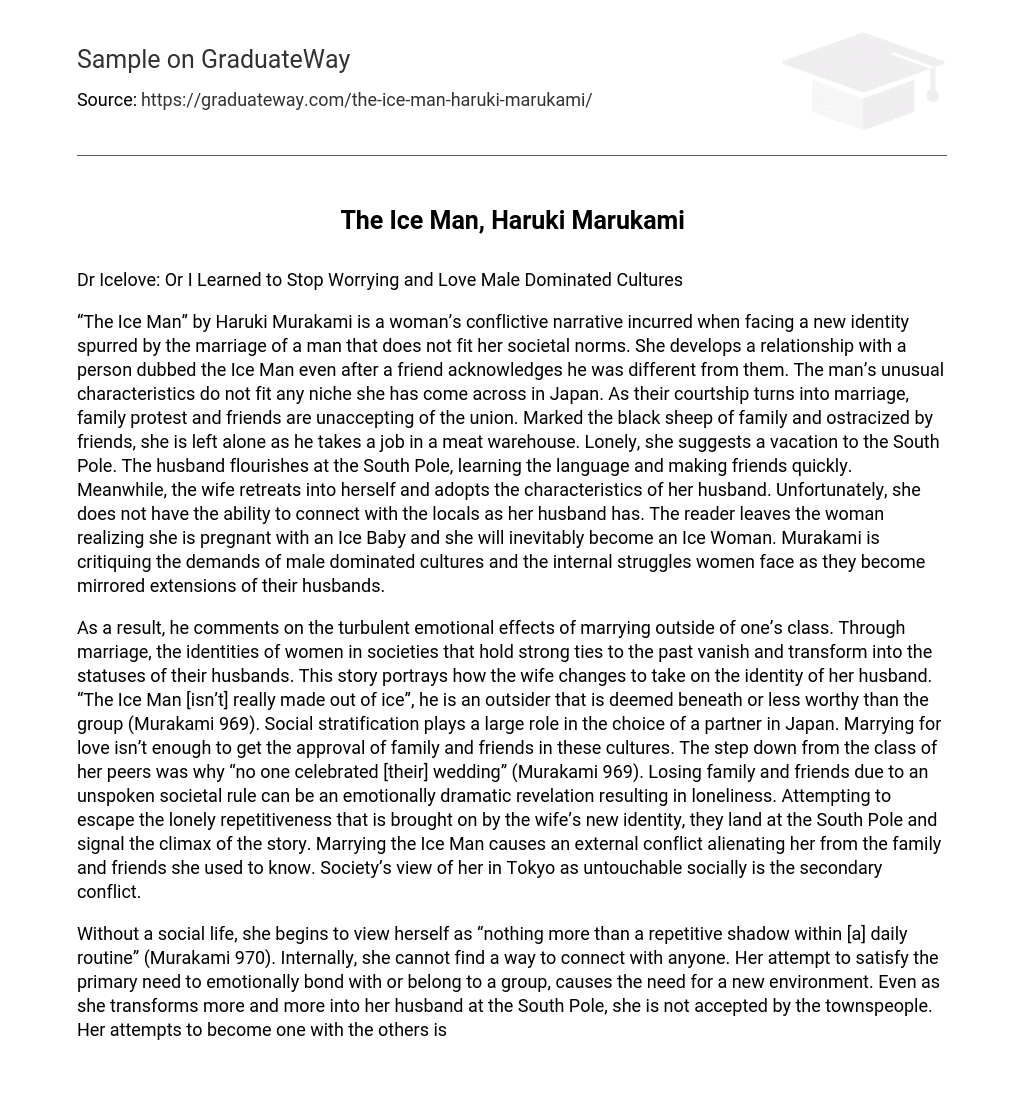Dr Icelove: Or I Learned to Stop Worrying and Love Male Dominated Cultures
“The Ice Man” by Haruki Murakami is a woman’s conflictive narrative incurred when facing a new identity spurred by the marriage of a man that does not fit her societal norms. She develops a relationship with a person dubbed the Ice Man even after a friend acknowledges he was different from them. The man’s unusual characteristics do not fit any niche she has come across in Japan. As their courtship turns into marriage, family protest and friends are unaccepting of the union. Marked the black sheep of family and ostracized by friends, she is left alone as he takes a job in a meat warehouse. Lonely, she suggests a vacation to the South Pole. The husband flourishes at the South Pole, learning the language and making friends quickly. Meanwhile, the wife retreats into herself and adopts the characteristics of her husband. Unfortunately, she does not have the ability to connect with the locals as her husband has. The reader leaves the woman realizing she is pregnant with an Ice Baby and she will inevitably become an Ice Woman. Murakami is critiquing the demands of male dominated cultures and the internal struggles women face as they become mirrored extensions of their husbands.
As a result, he comments on the turbulent emotional effects of marrying outside of one’s class. Through marriage, the identities of women in societies that hold strong ties to the past vanish and transform into the statuses of their husbands. This story portrays how the wife changes to take on the identity of her husband. “The Ice Man [isn’t] really made out of ice”, he is an outsider that is deemed beneath or less worthy than the group (Murakami 969). Social stratification plays a large role in the choice of a partner in Japan. Marrying for love isn’t enough to get the approval of family and friends in these cultures. The step down from the class of her peers was why “no one celebrated [their] wedding” (Murakami 969). Losing family and friends due to an unspoken societal rule can be an emotionally dramatic revelation resulting in loneliness. Attempting to escape the lonely repetitiveness that is brought on by the wife’s new identity, they land at the South Pole and signal the climax of the story. Marrying the Ice Man causes an external conflict alienating her from the family and friends she used to know. Society’s view of her in Tokyo as untouchable socially is the secondary conflict.
Without a social life, she begins to view herself as “nothing more than a repetitive shadow within [a] daily routine” (Murakami 970). Internally, she cannot find a way to connect with anyone. Her attempt to satisfy the primary need to emotionally bond with or belong to a group, causes the need for a new environment. Even as she transforms more and more into her husband at the South Pole, she is not accepted by the townspeople. Her attempts to become one with the others is “something [she] knew [she’d] never master” (Murakami 972). The setting of this story takes place on two different continents towards the end of the twentieth century symbolizing a downward movement and emotion.
Beginning at the top of a mountain in Japan and ending at the South Pole can be seen as transcending into another social class. Geographically the story moves to the bottom of the earth giving a sense of declining that relates to her state of mind. Population wise, the reader is shown a dramatic decrease in population. The mountain lodge is “crowded with hordes of young people” similar to herself (Murakami 967). Murakami shows not only the crowds, but also her commonality by having friends among them. The South Pole has “hardly anyone liv[ing] there” and certainly no one having anything in common with her (Murakami 972). The description of the desolate town mirrors her empty emotional state by the end of the story. The Ice Man portrays a modern Japanese woman of a certain social standing that marries a man who is seen below or outside of her class in society. Why a woman would find herself in such a lonely state as a result, the reader must understand some of the traditional social hierarchy in Murakami’s choice of setting. Japan sociologically holds strong ties to their ancestry where families are solely represented by the husband or father. Author and philosophy professor Miura Atsushi describes Japanese women as “non-holders of class status, who reach their social position only vicariously by means of marriage” (Schad-Seifert 149). When the wife selects the Ice Man as her husband, she has taken on a lesser identity than she previously held.
The lower social status is the reason for the ostracizing from her former class. Sociologist Hara Junsuke and Sayama Kazou note that the interior of “Japan has always been a socially and economically divided society in which polarization is not a recent phenomenon” (Schad-Seifert 139). Differing classes of people do not intermingle with one and another. The South Pole is a metaphor representing the Ice Man’s class that she hasn’t been able to adopt. The wife is still seen as an outsider even though she married out of her family and friend’s social standing. A woman without her own group is left alienated and lonely. Murakami is using his knowledge of Japan’s culture to portray the internal conflict a person has trying to leave their roots and groups not allowing assimilation into their differing classes.
Works Cited Charters, Ann. “The Ice Man.” The Story and Its Writer: An Introduction to Short Fiction. Boston, MA: Bedford/St. Martin’s, 2011. 967-73. Print. Schad-Seifer, Annette. “Gender and Class in Miura Atsushi’s Karyu ̄ Shakai [Low-Stream Society]: Literature Review.” Journal of the German Institute for Japanese Studies, Tokyo (2010): 137-52. ACC. Web. 20 Oct. 2013. .





